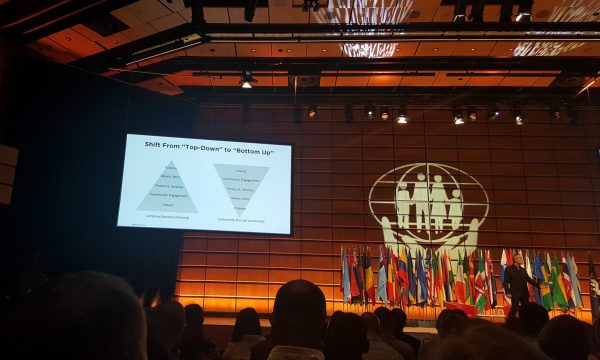Credit unions are uniquely positioned to be among the iconic brands of the future – but they need to get better at telling their stories, according to Simon Mainwaring, founder of brand consultancy We First.
He argued that credit unions could be in a special place in terms of leading in the financial industry because they are “fundamentally purposed and collaborative co-operatives that are not for profit”.
“Credit unions are the original crowd-sourcing model, not Indiegogo,” he said. Mr Mainwaring was a keynote speaker at the World Credit Union Conference in Vienna, where he shared tips on how credit unions could tell their story in a way that would inspire all stakeholders to activate that story with them.
He explained how in recent years members – particularly millennials – had become more aware of global issues such as climate change and sustainability. Technological and demographic changes also meant that credit unions had to change their approach to marketing.
“Every single person out there can be an extension of your marketing department. It’s an opportunity, as long as they are inspired,” he said.
The business case for purpose was revealed by a study in the Harvard Business Review, which found that companies that were prioritising purpose enjoyed a 10% growth or more.
“The most iconic brands of the future will be those with the greatest social impact,” said Mr Mainwaring.
“Credit unions are by definition right to be the leaders of the financial services because you can lead a movement. But to do that, you need to get your story out there.”
How can credit unions tell a purposeful story? Mr Mainwaring explained that the approach should be focused on recognising that stakeholders are not marketers. This means their key message should be down to one or two words to empower other people to talk about their brand. Values should also lie at the heart of the message, which needs to be specific, simple and consistent.

“Once you define your story to bring it to live shift from top down to bottom up,” he added.
Rather than explaining what their organisation has been doing to address a certain social issue, credit unions should focus on the issue first and then explain why it was important for them to tackle it.
His key tips of how to shift the focus are:
- Reach out to customers to tell stories of their journeys
- Co-create to increase amplification
- Collaborate to build a community
- Strike partnerships with other organisations expand reach
To create a successful brand, credit unions should also make sure their defined purpose is at the heart of everything they do, from creating products to marketing and working culture.
“The purpose is an incredibly powerful platform. Don’t make it about you, the celebrity, but about your customer community,” he told delegates in Vienna.
He gave the example of a Dove campaign that aimed to address the objectification of women. As a results of the initiative, Dove increased sales from USD $2.5bn in 2004 to USD4bn in 2014.
“Brands must also lead the conversations that positively shape consumer thinking and behaviour. What conversation are you leading? What are you uniquely qualified to lead? Your goal should be to shape culture. You have all these dynamics in your DNA: be a mission with a company, not a company with a mission!” added Mr Mainwaring. He explained how other brands were doing this already. “AirBnb is not in the accommodation business, it is in belonging business,” he said.
How can this be done? His main steps to building a successful brand are:
- Look at assets – where can you make material change? What is your unique opportunity to make material change?
- Identify what really matters to stakeholders, it is not good enough to just say you are a credit union.
- How can you scale your impact? For example, work with charities to create a group within your company focused on that.
“The challenges we face are so significant that we need business and financial institutions that really serve their members more effectively and make a difference in the world,” he said.
“You are uniquely positioned and qualified. The appetite among employees and members has never been greater. You will find the role you played inside your credit union more meaningful than ever.”

